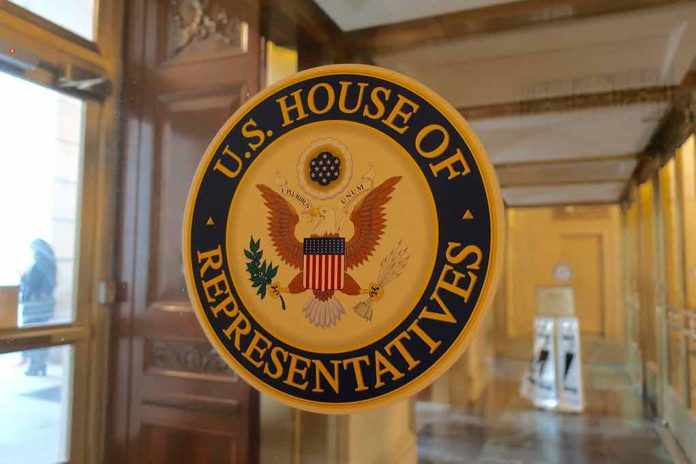
The Laken Riley Act passed the House with bipartisan support, marking a significant milestone in the 119th Congress.
At a Glance
- The Laken Riley Act passed the House with a vote of 264 to 159, including support from 48 Democrats
- The bill is named after a 22-year-old nursing student murdered by an illegal immigrant
- It allows states to sue the federal government for harm caused by illegal immigration
- The legislation requires detention of illegal aliens guilty of certain crimes
- The bill now moves to the Senate, where it needs 60 votes to advance
Bipartisan Support for Laken Riley Act
In a significant display of bipartisan cooperation, the House of Representatives passed the Laken Riley Act as the first piece of legislation in the 119th Congress. The bill, which garnered support from all Republicans and 48 Democrats, passed with a vote of 264 to 159. This landmark legislation addresses concerns about illegal immigration and its potential consequences.
The Laken Riley Act, introduced by Representative Mike Collins (R-Ga.) last year, is named after a 22-year-old nursing student who was tragically murdered by an illegal immigrant. The bill’s passage marks a crucial step in addressing immigration policies and their impact on public safety.
Just passed our first legislative bill of the 119th Congress, the Laken Riley Act. I was glad to see bipartisan support for a bill that requires DHS detain illegal immigrants arrested for crimes they've committed, ensuring these criminals are off our streets. Now to the Senate! pic.twitter.com/T0tz4XAEN5
— Congresswoman Jen Kiggans (@RepJenKiggans) January 7, 2025
Key Provisions of the Act
The Laken Riley Act introduces several significant measures aimed at strengthening immigration enforcement and accountability. One of the most notable provisions allows state attorneys general to sue the federal government for harm resulting from failures to implement immigration policies effectively. This includes the ability to seek injunctive relief for immigration-related decisions causing harm, including financial harm over $100.
Additionally, the bill mandates that the Department of Homeland Security (DHS) detain individuals unlawfully present in the U.S. who are charged with or convicted of certain crimes. Specifically, it requires federal immigration authorities to detain illegal aliens guilty of burglary, theft, larceny, or shoplifting. These provisions aim to address public safety concerns related to illegal immigration.
Political Implications and Next Steps
The passage of the Laken Riley Act in the House has significant political implications. House Speaker Mike Johnson criticized Democrats who voted against the bill, citing voter demands for secure borders. The bill’s bipartisan support in the House demonstrates a growing consensus on the need to address immigration-related issues.
The bill now moves to the Senate, where it faces a higher hurdle. To advance in the Senate, the Laken Riley Act will require 60 votes. Currently, only one Democrat, Sen. John Fetterman, is co-sponsoring the bill in the Senate. The Senate is set to vote on the bill this week, and its outcome will be closely watched as an indicator of potential bipartisan cooperation on immigration reform.
Conclusion
The passage of the Laken Riley Act in the House represents a significant moment in the 119th Congress. As the first bill to pass, it sets a tone for potential bipartisan cooperation on complex issues like immigration. While the bill faces challenges in the Senate, its progress thus far demonstrates a willingness among lawmakers to address pressing national concerns. The coming Senate vote will be crucial in determining whether this bipartisan momentum can be sustained and translated into meaningful legislative action.
Sources:
House passes Laken Riley Act to amp up border enforcement and put pressure on Democrats
House passes Laken Riley Act as 1st bill of new GOP-controlled Congress
Laken Riley Act Approved In House By All Republicans And 48 Democrats







